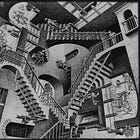"Is Everything Meaningless?" : On Nihilism, Agency, and an Absurd Existence | Existential Basics 3
a Short Essay for the Modern Existentialist

Cynicism is the only way in which base souls approach honesty. Thus, the higher man would listen closely to every coarse or subtle cynicism, and should [feel satisfaction] when a shameless clown or a scientific satyr speaks out precisely in front of him.
1 | Subject and Object: an Introduction to Agency
A Subject is a person; an Object is a thing.
A Subject is an Agent—someone who has the power, or Agency, to act on the world.
An Object is something that’s in the world, which can be acted on.
Something that’s Subjective, then, is something that someone thinks or believes—something that arises through the expression of a person’s Agency.
Something that’s Objective is a simple fact of the world, and of reality.
We established last time, in:
However, that our reality is Fundamentally Subjective—that it appears to us (to the best of our knowledge) only in the way which we perceive it. We can’t know anything to be strictly real—strictly Objective in its nature. We can’t know anything to be absolutely true—to be a metaphysically Objective fact of reality—because it’s impossible for us to either confirm or deny anything absolutely.
So, if our ideas of meaning, value, and truth—if our personal morals and the ethics of our society which we may have originally assumed to be Objective truths—are actually just Subjective judgements, then…
What does meaning… mean?
If our values aren’t inherent to the world—if we can’t consider them truly Objective—then what could truth even be?
If our world is a fiction—just something we make up as we go along—then doesn’t that mean that, in the end, nothing that really matters to us is actually real?
That nothing really matters… at all?
2 | A Meaningless Existence: Nihilist-Absurdist Theory
The world is cold and uncaring—a bleak, barren wasteland, completely devoid of any real, true meaning. We come and go as ash and soil—and between, we are nothing but sacks of flesh and bile.
That… is what the Nihilist believes.
Welcome to a brief summary of Nihilist-Absurdist Theory—a pair of philosophies which, in the western tradition, are typically attributed to Schopenhauer (or Cioran, for the finicky academic) and Camus, respectively… and may or may not have since transformed into the battle-cry of edgy teens everywhere.
Everything is meaningless.
This is the mantra of the Nihilist—though, typically, they don’t see themselves as such dark or depressive people. Usually, they’ll style themselves as tragic pragmatists or realists instead—as people who’ve just simply come to terms with a fundamental, Objective truth of the world. They believe that they’ve arrived at this kind of… transcendent, metaphysical wisdom—the knowledge that nothing is really real, and that everything moves inevitably toward a final, meaningless end.
They believe that, because we’re nothing more than just a brain in a body—because we live a fiction and can’t access an Objective reality—our existence is therefore fake; a lie and a sham, and that the real, true, Objective nature of our existence is just a meaningless nothing.
…
Can you see a problem yet?
If so, hold on to that thought, ‘cause we’re not quite done yet.
Let’s keep going.
This next step here—where the Nihilist then chooses (as a logical consequence of his philosophy) either to lay down and wallow in rage and despair, or to come to terms with his realization and just sit there for the rest of his life, staring at nothing in stoic silence…
This is where the Absurdist first takes to the stage.
Where the Nihilist is content to just let go—to deny his own Agency and let himself sink into the futility of his meaningless condition—the Absurdist chooses to rebel instead, embracing his Fundamental Subjectivity. Where the Nihilist believes that he’s impotent, and that nothing he can ever do will ever amount to anything, the Absurdist believes instead that, because everything is meaningless—because nothing will ever amount to anything—he is therefore perfectly free, and perfectly and completely his own man—
Completely and totally a Subject.
The Absurdist believes that existence is… well, Absurd. That, even though existence is fundamentally meaningless—though it’s an Objective fact of reality that our reality is fake—we, as human beings, are still somehow compelled by our biology to seek meaning in the world. That's what it means to say that existence is Absurd—that:
We feel that we must seek—even though we know that we’ll never find—meaning in our lives.
After all, if nothing means anything—if our world is just a simulation—then that means there are no restrictions. That there’s nothing that could ever hold you back again. If the world is fake—just a fantasy born from our own imaginations—then that means there can never be any consequences. When we die, it’s all over—so, while we’re here and still alive, we’re free to live our fullest lives.
Free from consequences. Free from responsibility.
Free from hope, and from fate.
And so, the Absurdist walks his path of revolt—to rebel against the Absurdity of existence and say this:
There is no meaning—no such thing as value or truth—and that’s okay. That’s good, because that means that we are truly free.
So, there’s a sense in which Nihilism and Absurdism are opposites—that is, in the sense that Nihilists look out at the world and are disappointed by its lack of Objective meaning… while Absurdists are instead elated to find themselves in a endless play-space of Subjectivity. The sense in which Nihilists reject their Agency as an unwelcome form of responsibility, while Absurdists instead embrace it as the key to their garden of infinite fantasy.
There’s another sense, though, in which they're both just the same. Both philosophies, after all, are founded upon and completely invested in the idea that existence is Objectively meaningless. Whether someone’s sad or mad or happy about that ultimately has no bearing on the underlying fact that their philosophy has built itself atop a claim that existence is inherently meaningless.
…Do you see the problem now?
3 | The Absurdity of Absurdism: The Existentialist’s Deconstruction
The fundamental flaw in Nihilist-Absurdist theory is that their philosophers base their theory on the idea that the dogma of the world is wrong—that existence isn’t inherently meaningful, as the majority of people might like to claim. And in this, they’re correct—after all, existence isn’t inherently meaningful. Where they go wrong, however, is in this next step of their reasoning.
They assume that, because the world isn’t inherently meaningful, it must, therefore, instead be inherently meaning-less.
In formulating their rejection of dogma, they take a logical leap—and then, immediately fall flat on their faces. They believe that they’ve rejected dogma—but, in reality, all they’ve done is reject a dogma:
The dogma which everyone else believes.
The fundamental problem with Nihilist-Absurdist theory is that they’ve failed to reach a rejection of inherence—a rejection of dogmatism as a whole. What they’ve done instead is simply just embrace the equal-and-opposite dogma.
A dogma… which rejects meaning.
We can’t claim, after all, that we know that meaning is inherently absent… because that’s a claim to the knowledge of a metaphysically Objective truth. The best we can say is, in the end, that we know (to the best of our ability) that there probably isn’t inherent meaning, because that’s what we can confirm empirically.
And so, we can see that the Nihilist and the Absurdist formulate a dogmatic rejection of dogma—that existence is not inherently meaning-ful, but instead inherently meaning-less. The empirical evidence, after all, doesn’t lead us to conclude that there’s no meaning or value in existence, because meaning—like truth—is a Value. It’s something that we create—something that we attach, assign, choose, and perceive; something which we imbue the world with.
It should be obvious, after all, that there is a form of meaning in the world—because things mean things to you. The fact that we create meaning doesn’t make that meaning fake… because the fact that we have created it makes it entirely real to us.
Our reality is a fiction—and, therefore, our fiction is our reality.
4 | Conclusions
So, using our principle of Fundamental Subjectivity, we can demonstrate that existence both:
Can’t be inherently meaning-ful, because meaning is value that we assign.
And also:
Can’t be inherently meaning-less… because meaning is value that we assign.
Existence just isn’t inherently anything at all—because existence is what we make of it.
…
Existentialism is an empirical philosophy. What that means is that, in order to reach a rational conclusion, we must work slowly and methodically—by process of elimination. By means of scientific and logical methodology, we, as Existentialists, should strive to deconstruct every claim to knowledge or truth to test its empirical and theoretical validity… before we choose to decide whether or not we’ll believe in its value as truth. That’s the reason why we attack, question, and try to destroy every belief system that we find, including our own—not out of malice, or arrogance, or spite… but instead, because we believe that it’s necessary to stress-test ideas before we can assign them truth-value. We fight because we choose to value the truth that we can know. After all, if someone believes that something is the truth, then they should be able to defend their position and demonstrate why they believe it’s the truth. And, if they can make a convincing argument after all, then…
We’d have a reason to change our minds, and to believe that it’s true too.













